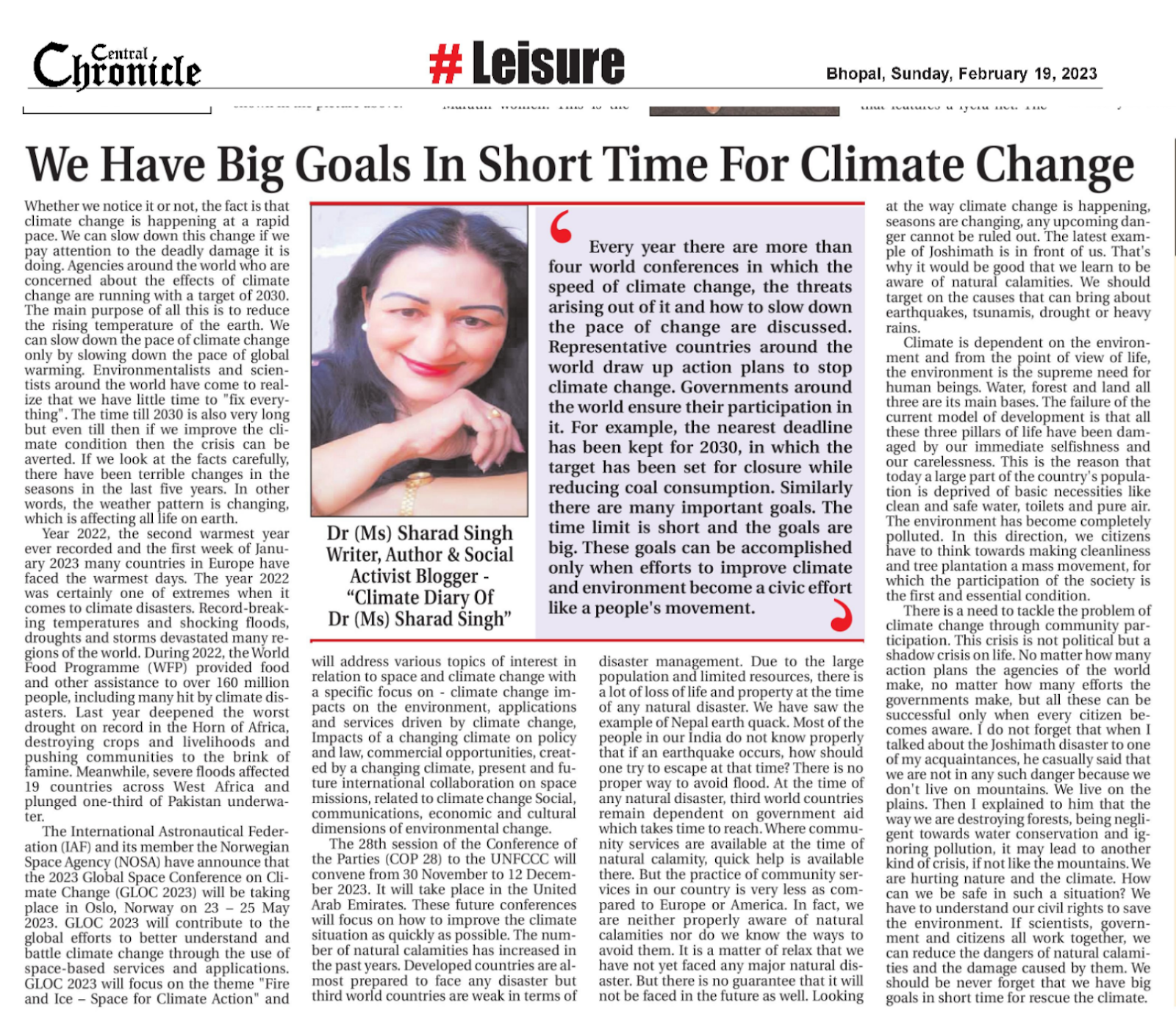Article | We Have Big Goals In Short Time For Climate Change | Dr (Ms) Sharad Singh | Central Chronicle
Article
We Have Big Goals In Short Time For Climate Change
- Dr (Ms) Sharad Singh
Writer, Author & Social Activist
Blogger - "Climate Diary Of Dr (Ms) Sharad Singh"
*Every year there are more than four world conferences in which the speed of climate change, the threats arising out of it and how to slow down the pace of change are discussed. Representative countries around the world draw up action plans to stop climate change. Governments around the world ensure their participation in it. For example, the nearest deadline has been kept for 2030, in which the target has been set for closure while reducing coal consumption. Similarly there are many important goals. The time limit is short and the goals are big. These goals can be accomplished only when efforts to improve climate and environment become a civic effort like a people's movement.*
Whether we notice it or not, the fact is that climate change is happening at a rapid pace. We can slow down this change if we pay attention to the deadly damage it is doing. Agencies around the world who are concerned about the effects of climate change are running with a target of 2030. The main purpose of all this is to reduce the rising temperature of the earth. We can slow down the pace of climate change only by slowing down the pace of global warming. Environmentalists and scientists around the world have come to realize that we have little time to "fix everything". The time till 2030 is also very long but even till then if we improve the climate condition then the crisis can be averted. If we look at the facts carefully, there have been terrible changes in the seasons in the last five years. In other words, the weather pattern is changing, which is affecting all life on earth.
Year 2022, the second warmest year ever recorded and the first week of January 2023 many countries in Europe have faced the warmest days. The year 2022 was certainly one of extremes when it comes to climate disasters. Record-breaking temperatures and shocking floods, droughts and storms devastated many regions of the world. During 2022, the World Food Programme (WFP) provided food and other assistance to over 160 million people, including many hit by climate disasters. Last year deepened the worst drought on record in the Horn of Africa, destroying crops and livelihoods and pushing communities to the brink of famine. Meanwhile, severe floods affected 19 countries across West Africa and plunged one-third of Pakistan underwater.
The International Astronautical Federation (IAF) and its member the Norwegian Space Agency (NOSA) have announce that the 2023 Global Space Conference on Climate Change (GLOC 2023) will be taking place in Oslo, Norway on 23 – 25 May 2023. GLOC 2023 will contribute to the global efforts to better understand and battle climate change through the use of space-based services and applications. GLOC 2023 will focus on the theme "Fire and Ice – Space for Climate Action" and will address various topics of interest in relation to space and climate change with a specific focus on - climate change impacts on the environment, applications and services driven by climate change, Impacts of a changing climate on policy and law, commercial opportunities, created by a changing climate, present and future international collaboration on space missions, related to climate change Social, communications, economic and cultural dimensions of environmental change.
The 28th session of the Conference of the Parties (COP 28) to the UNFCCC will convene from 30 November to 12 December 2023. It will take place in the United Arab Emirates. These future conferences will focus on how to improve the climate situation as quickly as possible. The number of natural calamities has increased in the past years. Developed countries are almost prepared to face any disaster but third world countries are weak in terms of disaster management. Due to the large population and limited resources, there is a lot of loss of life and property at the time of any natural disaster. We have saw the example of Nepal earth quack. Most of the people in our India do not know properly that if an earthquake occurs, how should one try to escape at that time? There is no proper way to avoid flood. At the time of any natural disaster, third world countries remain dependent on government aid which takes time to reach. Where community services are available at the time of natural calamity, quick help is available there. But the practice of community services in our country is very less as compared to Europe or America. In fact, we are neither properly aware of natural calamities nor do we know the ways to avoid them. It is a matter of relax that we have not yet faced any major natural disaster. But there is no guarantee that it will not be faced in the future as well. Looking at the way climate change is happening, seasons are changing, any upcoming danger cannot be ruled out. The latest example of Joshimath is in front of us. That's why it would be good that we learn to be aware of natural calamities. We should target on the causes that can bring about earthquakes, tsunamis, drought or heavy rains.
Climate is dependent on the environment and from the point of view of life, the environment is the supreme need for human beings. Water, forest and land all three are its main bases. The failure of the current model of development is that all these three pillars of life have been damaged by our immediate selfishness and our carelessness. This is the reason that today a large part of the country's population is deprived of basic necessities like clean and safe water, toilets and pure air. The environment has become completely polluted. In this direction, we citizens have to think towards making cleanliness and tree plantation a mass movement, for which the participation of the society is the first and essential condition.
There is a need to tackle the problem of climate change through community participation. This crisis is not political but a shadow crisis on life. No matter how many action plans the agencies of the world make, no matter how many efforts the governments make, but all these can be successful only when every citizen becomes aware. I do not forget that when I talked about the Joshimath disaster to one of my acquaintances, he casually said that we are not in any such danger because we don't live on mountains. We live on the plains. Then I explained to him that the way we are destroying forests, being negligent towards water conservation and ignoring pollution, it may lead to another kind of crisis, if not like the mountains. We are hurting nature and the climate. How can we be safe in such a situation? We have to understand our civil rights to save the environment. If scientists, government and citizens all work together, we can reduce the dangers of natural calamities and the damage caused by them. We should be never forget that we have big goals in short time for rescue the climate.
---------------------------------
(19.02.2023)
#climatechange #MyClimateDiary
#UNClimateChange
#savetheearth #CentralChronicle
#DrMissSharadSingh
#BigGoals #ShortTime #ClimateChange





Comments
Post a Comment